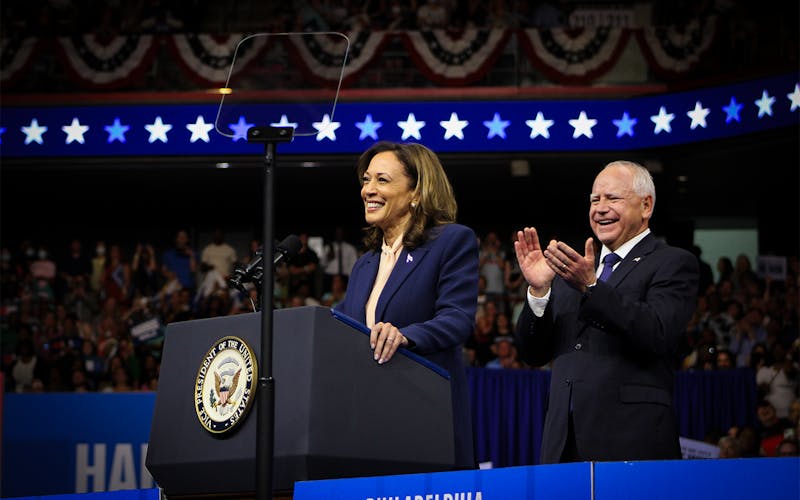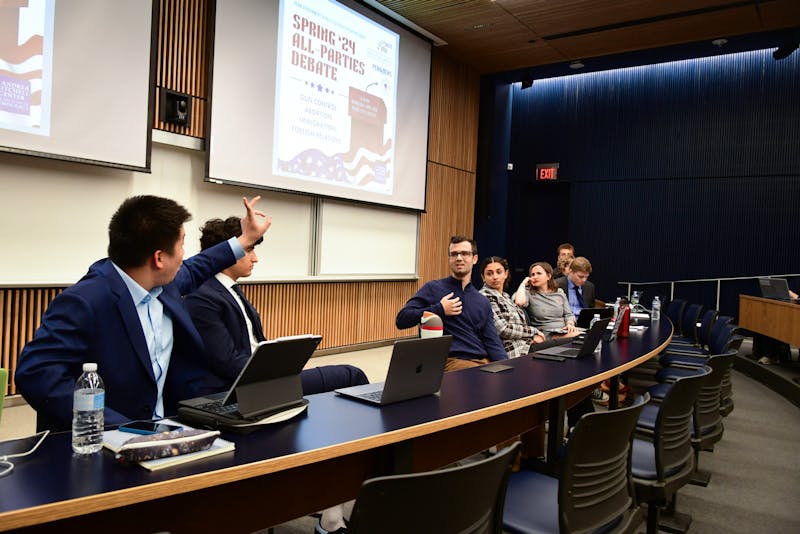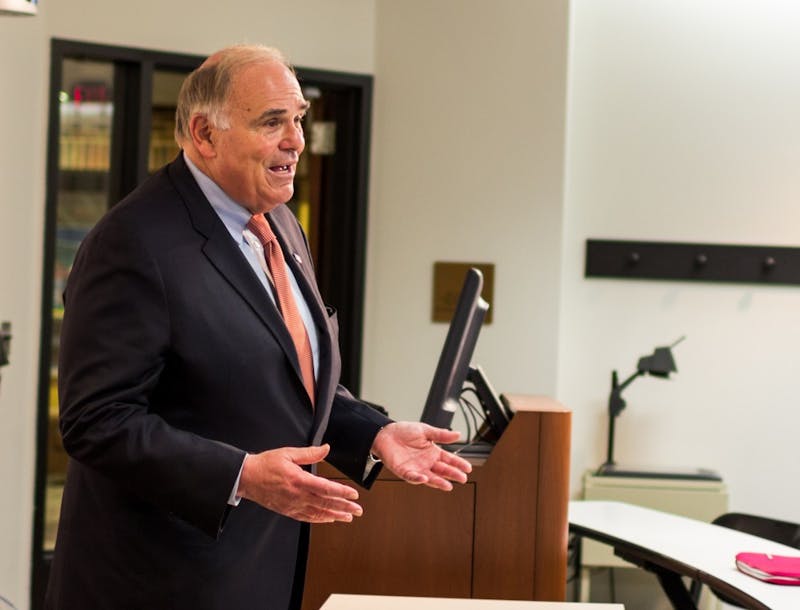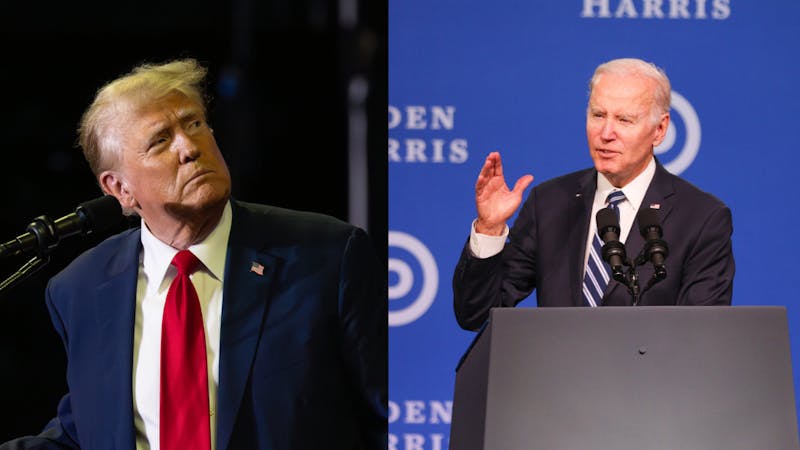
Tuesday night’s presidential debate between Vice President Kamala Harris and former President and 1968 Wharton graduate Donald Trump didn’t have an in-person audience — but the candidates' first-ever meeting was watched eagerly on Penn's campus, throughout Philadelphia, and across the country.
The 90-minute debate at the National Constitution Center was a chance for Harris to showcase her policy goals and public speaking chops on the national stage for the first time, while Trump — at his seventh general election debate — faced a new competitor who took the top of the ticket under two months ago. They sparred over topics such as foreign policy, immigration, the economy, and abortion.
Less than 10 minutes into the debate, both candidates mentioned the Wharton School of Business while discussing economic policy.
“What the Wharton School has said is Donald Trump’s plan would actually explode the deficit,” Harris said.
Harris was referring to a brief released on Aug. 26 by the Penn Wharton Budget Model, a nonpartisan initiative that provides economic analysis on public policy. The brief, which assessed Trump's 2024 campaign policy proposals, estimated that his tax and spending proposals would "increase primary deficits by $5.8 trillion over the next 10 years on a conventional basis."
In his rebuttal, Trump mentioned his status as a Penn alumnus.
“I went to the Wharton School of Finance, and many of the professors, the top professors, think my plan is a brilliant plan,” Trump said.
PWBM also conducted a similar analysis on Harris' campaign policy proposals, projecting that her plan would increase primary deficits by $1.2 trillion over the next 10 years.
Throughout the debate, Harris invoked the theme of her unofficial campaign slogan, “We’re not going back,” oftentimes drawing parallels between the Trump administration’s policies and those of President and former Penn professor Joe Biden’s administration. Trump, on the other hand, frequently returned to the topic of immigration — an issue that Harris is perceived to be weaker on by some political pundits — as a method of attack. In one instance, he cited a debunked story about Haitian immigrants in an Ohio city eating their neighbors’ pets.
Both candidates gave general directions to their policies if elected, but were sparse on specific details. Harris, in particular, has faced growing questions about her policy positions — especially given she entered the race under unusual circumstances and has not frequently answered questions from the press. Many had hoped that Tuesday night’s debate would be a chance to clarify her policy stances.
In the spin room before and after the debate, politicians on both sides of the aisle sought to reframe and support their respective candidates’ stances and performances, and told The Daily Pennsylvanian how their parties' respective presidential candidates will appeal to young voters.
Republican South Dakota Gov. Kristi Noem told the DP before the debate that Trump will appeal to Gen Z voters by “talking about the future.”
“Everybody knows what they’re struggling with today, and we tend to now — in campaigns and politics — get into a personality contest or get into a discussion on what’s happening 24 hours from now,” Noem said. “They really need to look into their [futures] that they’re planning and see which one of these candidates will give me the best opportunity to make my decisions for myself.”
In contrast, Sen. Tammy Duckworth (D-Ill.) told the DP that Harris has made her message “very clear” to voters about her stance on the Israel-Hamas war.
“She made her point across that we must … fight as hard as we can to bring the hostages home, but that we will also hold Israel accountable for the human rights violations that have happened in Gaza,” Duckworth said. “And we’re going to going to work towards ending the conflict there.”
California Gov. Gavin Newsom, a key surrogate for Harris, echoed Duckworth's message after the debate.
“I thought her answer was sound,” Newsom told the DP. “She wants the hostages home. She wants this war to come to an end. She wants a two-state solution.”
He added that the choice seemed “pretty clear” between Harris and Trump, who he said has “apparently got some secret plan” on how to end the violence.
The Israel-Hamas war has been a strong point of contention on college campuses — including at Penn — throughout the last academic year, sparking months of protests and controversy. Both Harris’ and Trump’s rhetoric on the conflict were closely watched at the debate, with Harris’ response watched for how it compares to Biden’s support for Israel throughout his presidency.
Democrats hosted also hosted multiple watch parties in Philadelphia on Tuesday night.
Over 500 community members were gathered at The Dell Music Center for a rally hosted by 2016 Fels Institute of Government graduate and Philadelphia Mayor Cherelle Parker, 1999 University of Pennsylvania Carey Law School graduate and Pennsylvania state Sen. Sharif Street (D-Philadelphia), and former Penn lecturer and Philadelphia Democratic Party Chair Bob Brady.
Street addressed the crowd, urging them to “show up” and vote for Harris.
“While [Donald Trump] is a very unserious person, as Vice President Harris says, the consequences of him in office [are] very serious,” he said, naming issues important to voters such as gun violence, women’s rights, and racism while criticizing the Trump administration’s position on the issues.
After the debate, Harris made a surprise appearance at her campaign’s official watch party in Old City, where she and her husband — Second Gentleman Doug Emhoff — were welcomed with cheers and applause from an energized crowd.
Emhoff kicked off the event by praising Harris’ debate performance, stating “I told you she was ready,” and asserting that she showed Donald Trump “what a real leader is” — a statement met with loud cheers.
Throughout her speech, Harris emphasized that her campaign is “people-driven,” thanking the audience members for their dedication and support by texting, emailing, and knocking on doors. She urged the crowd to continue their efforts, stating that “we gotta work tomorrow,” as she claimed that her campaign is still the “underdog.”
Biden previously dropped out of the race after a poor debate performance in late June — throwing the election cycle into uncertainty. In the months since, Harris has taken his place as the nominee and galvanized a wide range of supporters. Her first — and perhaps last — presidential debate was widely regarded to be a litmus test for the next several months leading up to Election Day on Nov. 5.
The Daily Pennsylvanian is an independent, student-run newspaper. Please consider making a donation to support the coverage that shapes the University. Your generosity ensures a future of strong journalism at Penn.
Donate








